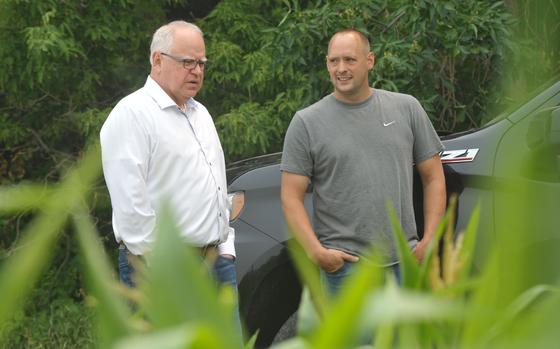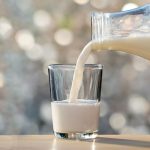
With the air thick with wildfire smoke and drought intensifying in Minnesota, Gov. Tim Walz met with farmers south of Millerville on Thursday.
He told them the state is trying to open up more hayground for farmers, but he also urged them to adapt to climate change.
“I don’t like to do the climate change thing to start a fight, it’s just the reality of it,” he said “It’s hotter now, it is smoky today, as we see some of these things and it’s not a value judgment, or an ideology, we should just adapt to it.”
He visited the dairy farm of Britney and Michael Roers, where drought has rendered about 25% of their corn crop worthless. Michael Roers drove the governor to see the stunted corn, that still has not formed cobs and likely won’t. Although the area has gotten a decent shot of rain recently, it came too late to help the corn crop.
The Roers are planning to chop all their 350 acres of corn for feed, which means they will miss out on this year’s hot corn prices.
“Hopefully the milk market will stay high,” Michael Roers said.
The smoke from Canadian forest fires lent an apocalyptic haze to the sky. According to the U.S. Drought Monitor, the area of extreme drought has expanded in Minnesota and covers most of Douglas County. In some places, wells have run dry, and the state is seeing clashes between irrigators and other water users, and has been reviewing irrigation permits. Minnesota Agriculture Commissioner Thom Peterson, who accompanied Walz on the visit, said he woke up in the middle of the night worrying about the state’s 10,000-cow dairies, as dairies typically use 30-40 gallons of water per cow per day. He said he was planning to check on those farms.
Walz steered clear of more controversial climate change-related topics such as deforestation and methane emissions from livestock while voicing support for technological adaptations such as drought-resistant seed and precision agriculture. He said policy can help adapt, but he said that as a capitalist, he also sees a role for market forces.
“I’m always trying to find a win-win, where it isn’t pitting one against the other,” he said. “I have said this and will continue to say it, the ability to produce feed, fuel and clothe the world doesn’t have to be in conflict with sustainable environmental practices. They can go hand in hand.”
He said state officials are trying to free up at least some of the one million acres in Minnesota that are enrolled in federal conservation programs for wildlife, but that there has been no movement so far on that. He also said that he has informed the Department of Natural Resources and the Minnesota Department of Transportation to allow farmers to take hay from ditches.
“I certainly don’t want to see somebody get in trouble for mowing a ditch,” he told Michael Roers.
They are also working with the Nature Conservancy, which also manages land in Minnesota, to see if any of those acres are available, and that the nonprofit organization is cooperating.
Walz said the state will help as it can, while also noting that the bulk of farmer aid programs come from the federal government. The federal aid is crucial, he said, to keeping groceries affordable.
“You watch how quickly people start to react to things when food prices go up,” he said.
Peterson said food prices are likely to rise, starting with meat. Even though some farmers are starting to sell their beef cattle over concerns about feed costs, the number of cattle in Minnesota has dropped over the past year, he said. He also expects milk prices to rise, followed by pork, poultry and then grains. Wheat has been hammered particularly hard in the state, he said, at about half its normal yield, with low protein levels.
Non-farmers may see the drought as a good thing, allowing more sunny days to fish and golf, Walz told the farmers.
“This is the most insidious,” Walz said. “If it’s a tornado people see it. It’s fast and it’s over, even flooding. But droughts are really difficult.”
Also visiting with Walz were local cattleman Joe Wagner, turkey growers Eric and Erica Sawatzke of Kensington, Ted Reichmann, a livestock, corn and soybean farmer from Villard, Rep. Jeff Backer, R-Browns Valley and Douglas County Commissioner Keith Englund.


























